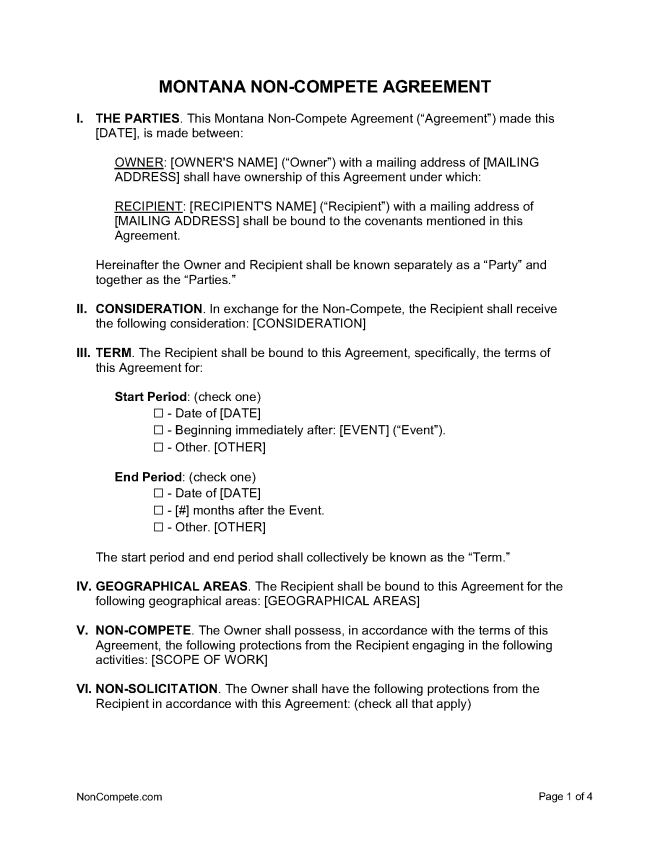A Montana non-compete agreement is a contractual provision that partially limits the kind of work someone may pursue. Technically, restraints of trade are prohibited by statute in Montana, but courts have interpreted the law to allow for partial or reasonable non-compete agreements. Nonetheless, Montana is less likely to enforce a non-compete agreement compared to other states.
Table of Contents |
Are Non-Competes Enforceable in Montana?
In limited circumstances, yes.
State statutes declare that restraints of trade are generally void (Mont. Code Ann. § 28-2-703) and allow non-competes only in association with the sale of the good will of a business (Mont. Code Ann. § 28-2-704) or in an agreement associated with the dissolution of a partnership (Mont. Code Ann. § 28-2-705).
However, court decisions have upheld non-compete agreements that impose reasonable restraints of trade, meaning an agreement that is:
- Limited in the restrictions of duration or geographic reach;
- Supported by good consideration;
- Offer only fair protection to the party seeking enforcement; and
- Not harm the public interest.
Montana Mountain Prod. v. Curl (2005).
Sale or Dissolution
Non-compete agreements that arise out of the sale of a business (Mont. Code Ann. § 28-2-704) or the dissolution of a partnership interest (Mont. Code Ann. § 28-2-705) must be no bigger geographically than the city or county where the business’s principal office is located, and any adjacent cities or counties.
Legitimate Business Interest
To be enforceable, non-compete agreements must protect a legitimate business interest. Legitimate business interests include preventing an employee from using the following to compete with a business once the employee has left:
- Valuable trade information
- Good will
- Customer relationships
Wrigg v. Junkermier, Clark, Campanella, Stevens, P.C. (2011).
Non-Disclosure
An agreement not to disclose trade secrets will be considered under the same framework as a non-compete agreement and must meet the same requirements of reasonableness. (State Med. Oxygen & Supply, Inc. v. Am. Med. Oxygen Co. (1989)
Prohibited Workers
Non-compete agreements contained in employment contracts, partnership agreements, or similar instruments that prevent an attorney from representing clients in the future are not enforceable, except for contracts regarding retirement benefits. Rule 5.6(a), Montana Rules of Professional Conduct.
Settlements of court cases that restrain a lawyer from practicing in the future are not enforceable. Rule 5.6(b), Montana Rules of Professional Conduct.
Terminating an Employee
To decide whether a non-compete agreement is enforceable against a terminated employee, courts balance:
- The business interest of the employer;
- The interests of the former employee; and
- The interest of the public.
Junkermier, Clark, Campanella, Stevens, P.C. v. Alborn, Uithoven, Riekenberg, P.C. (2016)
Burden of Proof
The party trying to enforce a non-compete agreement has the burden of showing that the agreement is reasonable. (State Med. Oxygen & Supply, Inc. v. Am. Med. Oxygen Co. (1989).
Continued Employment (consideration)
Continued employment is generally not adequate consideration to support a non-compete agreement. While non-compete agreements can be validly included with a contract offered at the time of hiring, if an employee is already working for a company, additional benefits must be offered, such as increased salary or responsibility. Access Organics, Inc. v. Hernandez (2008).
Maximum Term
There is little clarity about how long a non-compete agreement in an employment contract can last.
In Montana Mountain Prod. v. Curl (2005), the Montana Supreme Court held unenforceable a non-compete agreement lasting three years but did so because the agreement prevented the employee from working in the field at all, not because the term was too long.
More recently, in Junkermier, Clark, Campanella, Stevens, P.C. v. Alborn, Uithoven, Riekenberg, P.C. (2016), the state Supreme Court upheld a non-compete agreement lasting one year, but the agreement did not prohibit the employee from working for a competitor. Instead, the agreement required the payment of “liquidated damages” if the former employee went to work for a competitor.
In the context of the sale of a business, the Montana Supreme Court has upheld a non-compete agreement lasting five years. Friedman v. Lasco (2016).
Blue Penciling (allowed)
Courts may limit the reach of an unenforceable non-compete agreement without voiding it entirely. (Dumont v. Tucker (1991))
